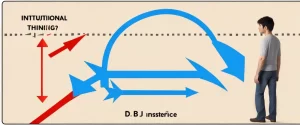
In today’s fast-paced world, where success is often measured in terms of productivity, efficiency, and achievement, individuals are constantly seeking ways to gain a competitive edge and unlock their true potential. Two influential authors, Darren Hardy and Daniel H. Pink, tackle this pursuit with their groundbreaking self-improvement books, “The Compound Effect” and “A Whole New Mind,” respectively.
“The Compound Effect” by Darren Hardy is a powerful guide that explores the principle of compounding small actions over time to create significant results. Drawing on his personal experiences and interviews with successful individuals, Hardy emphasizes the critical role that consistency, discipline, and continuous improvement play in achieving long-term success.
On the other hand, Daniel H. Pink presents a thought-provoking perspective in “A Whole New Mind,” challenging traditional notions of success by arguing that in the age of abundance, right-brain thinking will be the key to thriving in the future. Pink asserts that the development of skills such as empathy, creativity, and design thinking will allow individuals to navigate the complexities of the modern world, where automation and technology are rapidly reshaping industries.
Though seemingly disparate, both books offer valuable insights for individuals seeking personal and professional growth, albeit from contrasting viewpoints. While “The Compound Effect” focuses on the power of consistent action and discipline in achieving success, “A Whole New Mind” puts forward the notion that creativity and holistic thinking are becoming increasingly valuable skills in the new era.
In this comparative study, we will delve into the similarities and differences between these two transformative works, exploring how the principles outlined in each book can be applied to transform one’s personal and professional life. By examining the key themes, principles, and practical strategies outlined within “The Compound Effect” and “A Whole New Mind,” we aim to provide readers with a comprehensive understanding of how these books can serve as life-changing resources in their journey towards success and self-fulfillment.
Ultimately, whether you seek incremental progress through cultivating disciplined habits or wish to embrace a more holistic approach to navigate the challenges of the future, these two influential books present contrasting perspectives that invite readers to reflect and explore the path towards personal and professional excellence. Through this comparative study, we invite you to embark on an enriching literary journey that promises to illuminate the path towards success while challenging conventional thinking along the way.
Brief Summary of Two Books
The Compound Effect by Darren Hardy
“The Compound Effect” by Darren Hardy is a self-help book that explores the concept of small, consistent actions leading to significant results over time. The author emphasizes how making small positive changes and consistently following through with them can result in long-term success in various aspects of life, such as finances, relationships, and health. Hardy explains how small habits and decisions, compounded over time, have a compounding effect on our overall success and well-being. He provides practical strategies, actionable steps, and real-life examples to illustrate the power of compounding. The book ultimately encourages readers to take charge of their lives by implementing small, positive habits that will accumulate into substantial achievements.
A Whole New Mind by Daniel H. Pink
“A Whole New Mind” by Daniel H. Pink explores the shift in the skill sets that are increasingly becoming valuable in the 21st century. Pink argues that in the age of abundance, globalization, and automation, left-brain dominant skills like logic and analysis are no longer enough to thrive in the modern economy. He suggests that individuals need to develop their right-brain skills, such as creativity, empathy, and intuition, to adapt to the changing landscape.
The book is divided into six key senses or aptitudes that Pink believes are critical for success in the Conceptual Age: design, story, symphony, empathy, play, and meaning. He provides examples and case studies from various fields to illustrate how these skills can be cultivated and applied.
Pink emphasizes the importance of creativity, asserting that it is no longer restricted to the realm of art but is a valuable asset in areas such as business, science, and education. He argues that the ability to think creatively, connect ideas, and design meaningful experiences will be highly sought after in the future.
Furthermore, Pink discusses the need for individuals to develop their empathy and emotional intelligence to navigate the increasing interconnectedness of the world. He argues that being able to understand and relate to others’ experiences is crucial for building successful relationships, both personally and professionally.
Throughout the book, Pink encourages readers to embrace right-brain aptitudes and integrate them with their left-brain skills. He provides practical tips and exercises to help individuals develop their right-brain capabilities and adapt to the changing demands of the modern world.
In summary, “A Whole New Mind” presents a persuasive argument for the importance of cultivating right-brain skills in a left-brain dominated world. Pink urges readers to embrace their creativity, empathy, and intuition, as these attributes are becoming increasingly valuable in shaping a successful and fulfilling life in the Conceptual Age.
Comparison between Two Books

Similarities in Self Help
Both “The Compound Effect” by Darren Hardy and “A Whole New Mind” by Daniel H. Pink share a common focus on self-help and personal development. Here are some similarities in the themes and strategies of self-help presented in the two books:
1. Mindset Shift: Both books emphasize the importance of adopting a positive and growth-oriented mindset. They promote the idea that the way we think shapes our actions and outcomes in life.
2. Holistic Approach: Both authors stress the significance of looking at personal growth from a holistic perspective. They encourage readers to consider various aspects of their lives, including relationships, career, health, and personal goals, to create a well-rounded and fulfilling life.
3. Small Steps Matter: Both books emphasize the power of taking small, consistent actions to achieve meaningful results. They highlight the compound effect of making incremental changes over time and how these small steps can lead to significant personal transformation.
4. Accountability and Discipline: Both Hardy and Pink discuss the importance of holding ourselves accountable for our actions and decisions. They emphasize the need for discipline and consistently following through on our commitments.
5. Developing Emotional Intelligence: Both authors touch on the significance of emotional intelligence in personal development. They stress the importance of self-awareness, empathy, and managing emotions effectively to improve relationships and achieve success.
6. Creativity and Innovation: While “The Compound Effect” focuses more on personal habits and productivity, “A Whole New Mind” explores the importance of creativity and innovation in a rapidly changing world. Both books encourage readers to nurture their creative thinking abilities to thrive in the modern workforce and society.
7. Cultivating a Growth Mindset: Both authors advocate for embracing a growth mindset, which involves viewing challenges as opportunities for growth, seeking feedback, and continuously learning and improving.
Overall, “The Compound Effect” and “A Whole New Mind” share the goal of empowering individuals to take control of their lives, cultivate positive habits, and embrace personal transformation. They offer practical guidance and strategies to help readers develop a more fulfilling and successful life.
Divergences in Self Help
The Compound Effect by Darren Hardy and A Whole New Mind by Daniel H. Pink are two popular self-help books that offer unique perspectives on personal development. While both books aim to inspire individuals to improve themselves, they diverge in their approaches and concepts.
1. Approach:
– The Compound Effect focuses on making small, consistent changes over time to achieve significant results in various areas of life. It emphasizes the power of habit-building and staying disciplined.
– A Whole New Mind, on the other hand, encourages individuals to develop right-brain thinking skills to thrive in the future. It argues that creativity, empathy, and holistic thinking will be crucial in a world driven by automation and technology.
2. Conceptual Differences:
– The Compound Effect delves into personal productivity, goal setting, and self-discipline. It focuses on incremental changes, encouraging readers to consider how their daily choices and actions can lead to long-term success.
– A Whole New Mind presents the idea that future success relies on the cultivation of six essential aptitudes: design, story, symphony, empathy, play, and meaning. It asserts that individuals need to shift from a purely logical and analytical left-brain mindset to embrace these right-brain skills.
3. Application:
– The Compound Effect provides practical tips on creating positive habits, setting goals, and managing time effectively. It offers strategies for achieving financial success, improving relationships, and enhancing health.
– A Whole New Mind explores how to develop an innovative and creative mindset, suggesting activities to exercise the right-brain aptitudes and offering examples of industries where these skills are valuable. Pink encourages readers to build upon their existing strengths while developing new capabilities.
Overall, The Compound Effect emphasizes the power of consistent action and personal accountability for achieving success in any area of life, while A Whole New Mind highlights the importance of nurturing right-brain thinking to adapt to the changing demands of the future. Despite their distinct approaches, both books ultimately aim to assist individuals in their personal growth and provide strategies for navigating the complexities of modern life.

Conclusion
Both The Compound Effect by Darren Hardy and A Whole New Mind by Daniel H. Pink are highly regarded books that offer valuable insights and personal development advice. The choice between the two ultimately depends on your interests and goals.
The Compound Effect focuses on the power of small actions and consistency to achieve significant long-term results. It emphasizes the importance of mindset, habits, and taking personal responsibility for one’s actions. This book is well-suited for individuals looking to improve their productivity, make positive changes, and achieve success in various aspects of their lives.
On the other hand, A Whole New Mind explores the importance of right-brain thinking in a left-brain dominant world. It highlights the increasing significance of creativity, empathy, and holistic thinking in the modern era. This book is recommended for those who want to thrive in the creative economy and embrace their creative potential.
Ultimately, the worthiness of a book is subjective and depends on your personal preferences and goals. Consider your interests and which topic resonates with you more – personal development and success (The Compound Effect) or creativity and adaptability (A Whole New Mind). Both books have valuable insights to offer, so choosing either one would be a worthwhile investment of your time.



